Gum disease and tooth decay are significant health concerns for Dalmatians, just as they are for humans. These conditions can lead to discomfort, bad breath, and more serious health issues if left untreated.
However, with preventive measures and proper care, you can protect your Dalmatian’s oral health. It starts with an understanding of the unique risks your spotted friend may face and how dental problems can develop.
Oral health in Dalmatians encompasses not just the teeth and gums, but also the lips, tongue, and the roof of the mouth.
Regular dental care, including brushing and professional cleanings, plays a crucial role in maintaining your Dalmatian’s oral hygiene.
Recognizing the early signs of gum disease and tooth decay can help ensure prompt treatment, preventing more extensive health issues.
Diet, chew toys, and dental check-ups are part of a comprehensive approach to your Dalmatian’s dental health, which can help keep them healthy and happy for years to come.
Key Takeaways
- Regular dental care reduces the risk of gum disease and tooth decay in Dalmatians.
- Recognizing early signs of oral health issues is essential for timely intervention.
- A comprehensive dental care approach is key to maintaining your dog’s overall well-being.
Understanding Dalmatian Oral Health
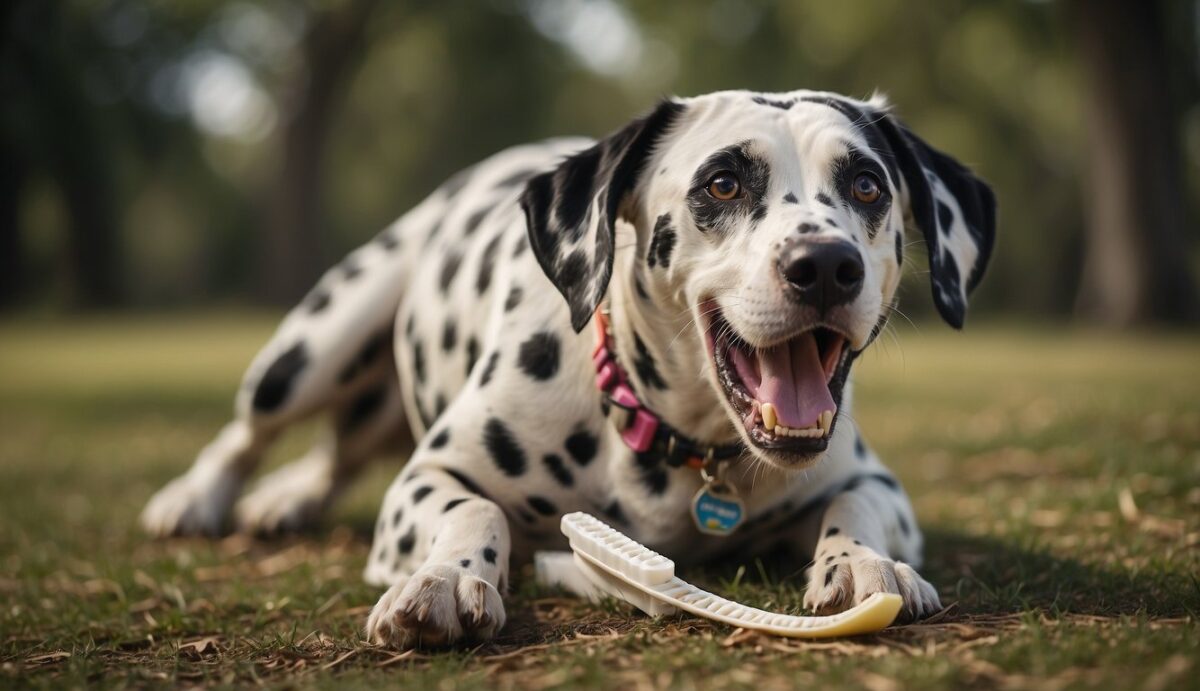
Your Dalmatian’s oral health is a key aspect of their overall wellbeing. Just like in humans, their teeth can build up plaque, which, if not removed, hardens into tartar. This can lead to gum disease and tooth decay, conditions that are not just painful for your pet but can also lead to more serious health issues.
Oral Hygiene Practices:
- Regular brushing: At least 2-3 times a week
- Use a soft-bristled brush
- Employ canine-specific toothpaste
Despite their shiny coats and lively personalities, Dalmatians are prone to dental problems. Caries or cavities can form due to demineralization of the enamel, which is the hard, protective outer layer of the teeth. Poor oral hygiene can accelerate this process.
Here’s a simple breakdown of what happens:
- Plaque Formation: Bacteria in the mouth feed on food particles and produce plaque.
- Tartar Accumulation: If plaque isn’t removed, it calcifies into tartar.
- Gum Disease: Tartar at the gumline inflames the gums, causing gingivitis.
- Tooth Decay: Prolonged tartar and plaque presence lead to decay.
To prevent cavity formation and protect your Dalmatian’s oral health, it’s crucial to establish a dental care routine.
Be proactive in scheduling veterinary cleanings and providing your dog with dental chews that help reduce plaque and tartar build-up. Your attention to their oral care can make a huge difference in their quality of life.
Importance of Dental Care in Dogs
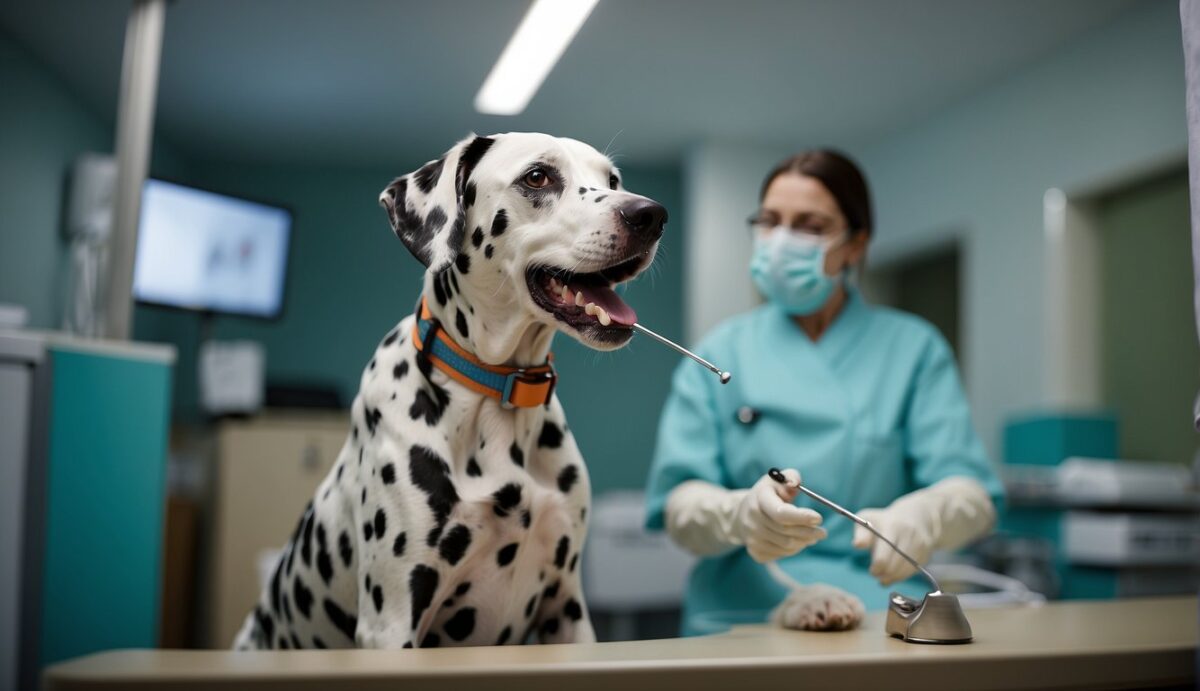
Taking care of your Dalmatian’s teeth is crucial for preventing gum disease and tooth decay, which can significantly affect their quality of life and overall health. Let’s dive into what this entails and why it’s so important.
Periodontal Disease in Dalmatians
Periodontal disease, an infection of the gums, can lead to severe health issues in Dalmatians. Bacteria under the gum line can cause inflammation and, if left untreated, result in bone loss and tooth loss.
Tooth Loss and Its Consequences
When your Dalmatian loses teeth, it’s more than just a cosmetic issue.
Tooth loss can affect their ability to eat and may lead to nutrition problems. It’s also often a sign of underlying periodontal disease.
Effects of Oral Health on Systemic Conditions
Bad oral health can lead to systemic conditions like heart, liver, and kidney disease. The bacteria from dental diseases can spread through the bloodstream, affecting your Dalmatian’s entire body.
Oral Health and Behavioral Indicators
Changes in your Dalmatian’s behavior, like reluctance to eat or play with toys, could indicate dental pain. These signs shouldn’t be ignored as they can point to serious oral diseases.
The Role of Oral Health in Dalmatian Puppies and Adolescents
Proper oral care starts early. For puppies and adolescents, dental care is vital for proper development. Teething and proper puppy teeth development can be supported with appropriate chew toys and dental health practices.
Senior Dalmatians and Oral Health Challenges
As Dalmatians age, they may face more oral health challenges. Regular vet check-ups and cleanings are crucial for maintaining their quality of life during their senior years.
Oral Health Disparities in Dalmatians
Dalmatians from low-income households may not receive the same level of dental care, leading to disparities in oral health. Preventive measures and education can help bridge this gap.
The Economic Impact of Dental Diseases
The costs of treating oral diseases can add up. Preventive dental care can reduce emergency room visits and save on medical expenses in the long run. It also helps to keep your Dalmatian out of pain and discomfort.
Preventing Oral Health Problems in Dalmatians
To prevent dental problems, regular brushing, dental chews, and professional cleanings are recommended. Community water fluoridation can also be beneficial in preventing tooth decay.
Common Oral Health Myths Debunked
It’s a myth that Dalmatians can maintain healthy teeth just by chewing on kibble and toys. Tooth brushing and regular veterinary care are necessary to prevent dental diseases and maintain overall health.
Routine Dental Care for Dalmatians
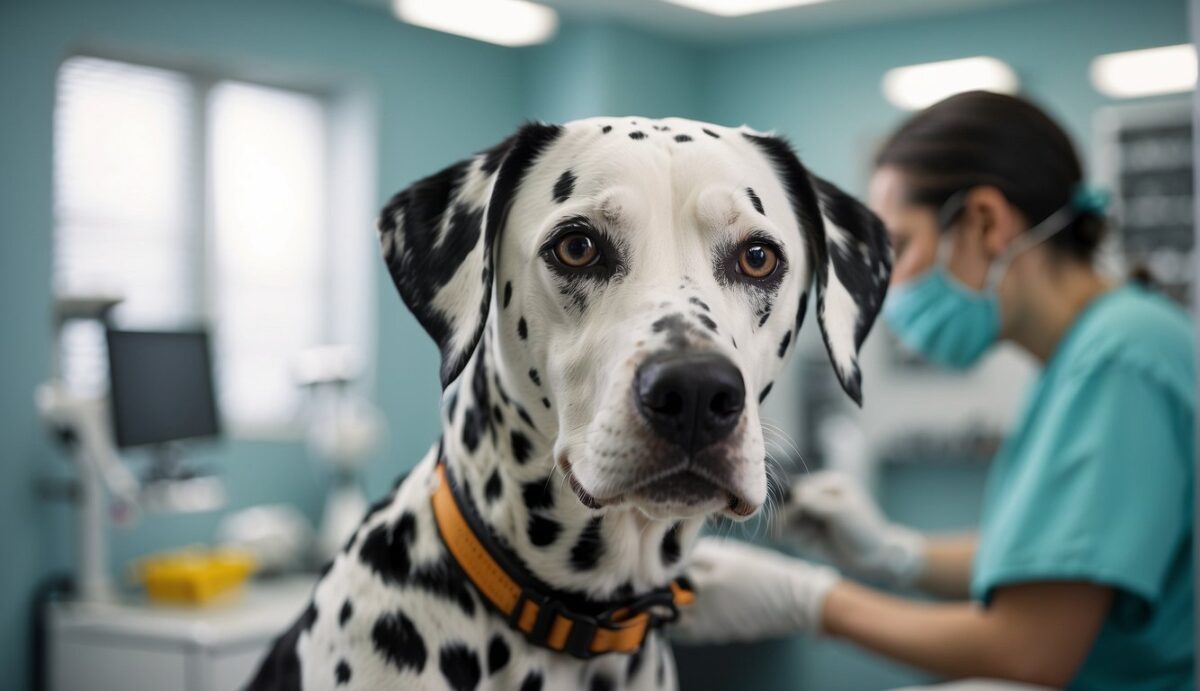
Maintaining good oral hygiene for your Dalmatian can prevent gum disease and tooth decay. This includes regular brushing, professional cleanings, and knowing when to seek dental check-ups.
Brushing Your Dalmatian’s Teeth
Start by selecting a soft-bristled toothbrush and fluoride-free toothpaste made specifically for dogs.
Your daily brushing sessions will remove plaque and help prevent tartar build-up on your Dalmatian’s teeth.
The Importance of Professional Dental Cleanings
Annual dental cleanings by a veterinarian or hygienist are crucial.
These cleanings often involve an x-ray to diagnose any underlying conditions, followed by scaling to remove tartar and polishing.
Dental Treats and Chewing Toys
Incorporating dental treats and specially designed chew toys can bolster your Dalmatian’s dental health. These items help clean the chewing surfaces of the teeth and can reduce plaque.
Water Additives and Diet for Oral Health
Additives designed for oral health can be added to your Dalmatian’s drinking water to help maintain clean teeth and healthy gums. A balanced diet with minimal sugar also supports good oral hygiene.
Recognizing the Need for Dental Check-Ups
Regular check-ups are key. If you notice bad breath, discolored teeth, or changes in eating habits, it’s time for a dental check-up.
Oral Care Products and Their Use
Your dog’s size and dental health status will determine the best oral care products to use. Be sure to use items that effectively remove plaque and keep gums healthy.
The Role of Dental Insurance and Care Access
Dental insurance and programs like Medicaid can help provide access to necessary dental care, including emergencies.
Navigating Dental Emergencies
In the case of an oral injury or severe symptoms like a swollen face, immediate veterinary care is required. Dental emergencies can lead to serious complications if left untreated.
Training Your Dalmatian for Dental Care
Gradually introduce your Dalmatian to the idea of toothbrushing and dental inspections at home. Reward them for cooperation to make the process smoother for both of you.
Addressing Special Dental Care Needs
Some Dalmatians may have specific dental issues that require special care, such as dental crowns or root canal treatment. Consult your veterinarian for guidance.
Gum Massage and Oral Stimulation
Gum massage can increase blood circulation and reduce the risk of gingivitis. Oral stimulation through toys and treats plays a vital role in maintaining dental health.
Significance of Flossing in Dogs
While not as common as in human dental care, interdental cleaning or flossing can be beneficial if done correctly. Consult with a vet or professional groomer for the appropriate techniques.
Sealants and Fluoride Applications
Ask your veterinarian about sealants and fluoride applications that can protect your Dalmatian’s teeth from decay, strengthening tooth enamel and preventing cavities.
Tartar Control and Scaling
Regular brushing and professional cleanings can control tartar build-up. However, if tartar does form, scaling by a professional is necessary to remove it and prevent periodontal disease.
Common Dental Issues and Treatments
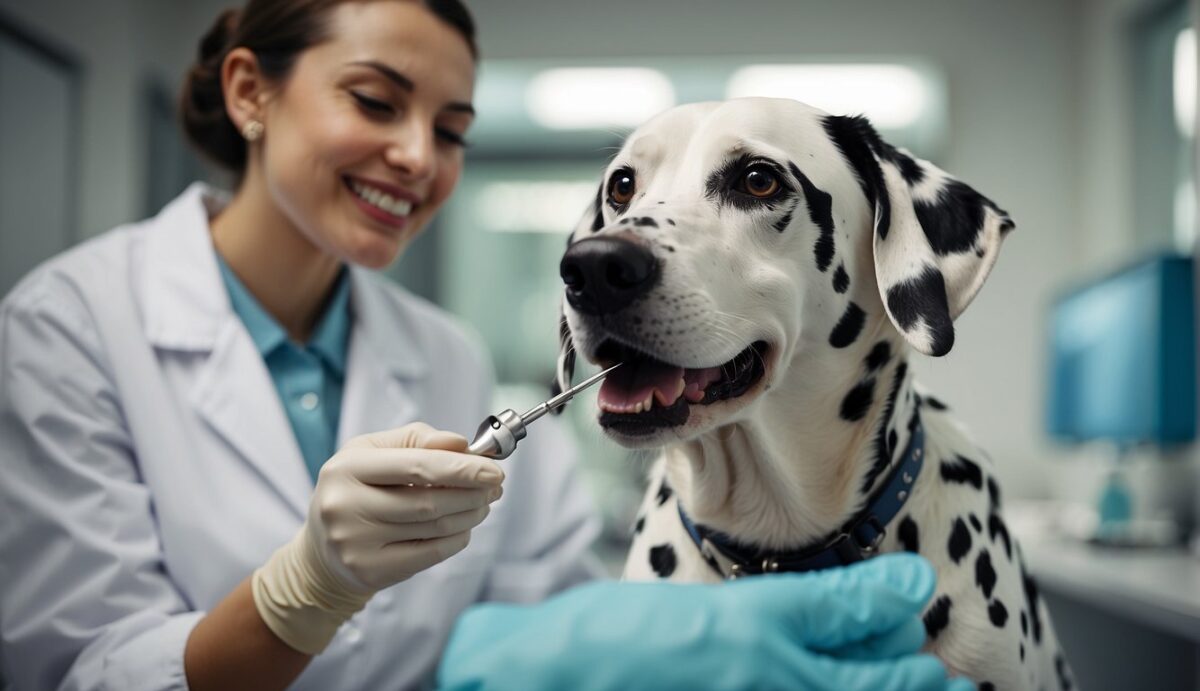
Your Dalmatian’s smile reflects their health. Gum disease and tooth decay are prevalent issues that can lead to serious complications if not addressed. The following subsections delve into recognizing signs and employing effective treatments to maintain your pet’s oral well-being.
Identifying and Treating Gum Disease
Gum disease, or periodontitis, begins as gingivitis signaled by swollen or bleeding gums.
Your vet may suggest a regimen that includes cleaning, scaling, or possibly root planing to manage gum disease. Consistent oral care at home is crucial to prevent progression.
Cavities and Tooth Decay: Causes and Remedies
Tooth decay occurs due to demineralization from acidic bacterial byproducts, leading to cavities.
Fluoride treatments and fillings can remedy this issue.
Regular dental check-ups can catch cavities early, preventing extensive tooth damage.
Dealing with Tooth Infections and Abscesses
If bacteria reach the tooth’s pulp, it may lead to an infection or abscess.
Signs include swelling and pain.
Treatment typically involves a combination of root canal therapy and antibiotic administration to eradicate the infection.
Preventing and Managing Tooth Loss
To prevent tooth loss, control plaque and address dental issues promptly.
If tooth loss does occur, dental crowns or implants can restore functionality.
Ensure you maintain routine dental visits for early detection and treatment of potential problems.
Effects of Diet on Oral Health
A diet high in sugar can increase the risk of tooth decay and gum disease.
Feed your Dalmatian a balanced diet, use specially formulated dental chews, and avoid excessive treats that contribute to plaque buildup.
Handling Dental Pain and Discomfort
Dental pain often indicates underlying problems such as cavities or infections.
Minimize discomfort with pain management protocols prescribed by your dentist.
Maintain a soft-food diet as needed during periods of severe dental pain.
Restorative Procedures for Dental Health
Restorative options like fillings, dental crowns, and root canal treatments can repair or save a compromised tooth.
These procedures are instrumental in maintaining dental health and preventing further decay or tooth loss.
Advanced Periodontal Disease Treatment
In advanced cases of periodontal disease, where there is significant bone loss or deep gum pockets, specialized treatments may be necessary.
These treatments include surgeries and tissue regenerative procedures.
Challenges of Oral Cancer in Dogs
Detecting and managing oral cancer early is vital.
Symptoms may include inflammation, unusual growths, or bleeding in the mouth.
Treatment can range from surgery to chemotherapy, based on the stage and severity.
Managing Oral Inflammation in Dogs
Chronic oral inflammation, or gingivitis, can often be controlled with professional cleanings and a robust at-home oral health routine.
Anti-inflammatory medications may be prescribed by your vet if the condition persists.
Bacterial Infections and Antibiotic Use
Should your Dalmatian suffer from a bacterial infection, your vet will likely prescribe antibiotics.
Monitoring your dog’s response to the treatment is important, as well as completing the medication course to prevent antibiotic resistance.
Lifestyle and Prevention Strategies
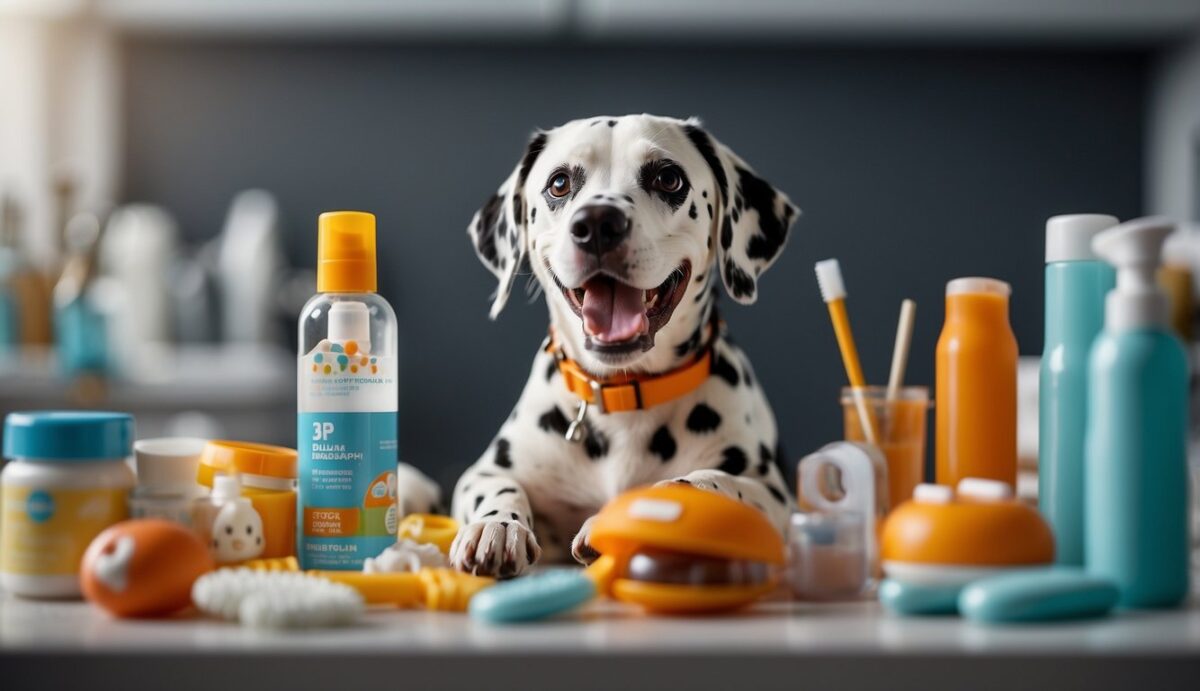
There’s a strong connection between your daily habits and the health of your Dalmatian’s mouth. Prioritizing certain lifestyle choices can significantly influence the prevention and treatment of gum disease and tooth decay.
The Impact of Smoking on Oral Health
Smoking greatly elevates the risk of developing oral diseases in your Dalmatian.
It can lead to gum disease, tooth decay, and even oral cancer.
It’s crucial for the wellness of your pet to avoid exposure to tobacco smoke, as it can compromise their oral hygiene routine.
Nutritional Recommendations for Dental Health
A healthy diet is paramount in preventing oral health issues.
Including crunchy fruits and vegetables in your Dalmatian’s diet can help naturally clean their teeth.
Additionally, ensure they have access to plenty of water, especially if it’s fluoridated, as it helps reduce tooth decay.
Importance of Regular Oral Hygiene
Practicing regular oral hygiene, including daily brushing and flossing of your pet’s teeth, is essential.
Use a canine-specific toothbrush and toothpaste to maintain optimal oral health.
Regular cleaning by a professional may also be necessary to address plaque and tartar buildup.
The Connection Between Oral Health and Overall Well-Being
Good oral hygiene can prevent diseases that affect not just your Dalmatian’s mouth, but their overall health.
Oral infections can lead to more serious conditions, including heart and chronic kidney diseases.
Maintaining their oral health is crucial for their general well-being.
Environmental Factors Affecting Dalmatian Dental Health
Environmental factors such as pollutants or secondhand smoke can adversely affect your Dalmatian’s dental health.
Be mindful of your pet’s environment and minimize their exposure to harmful substances.
Behavioral Aspects of Dental Care
Cultivating good behaviors around dental care is key.
Training and establishing a routine for oral care activities, like brushing, can instill good habits.
Encourage positive experiences associated with dental care from a young age.
Innovations and Future Directions in Canine Dental Care
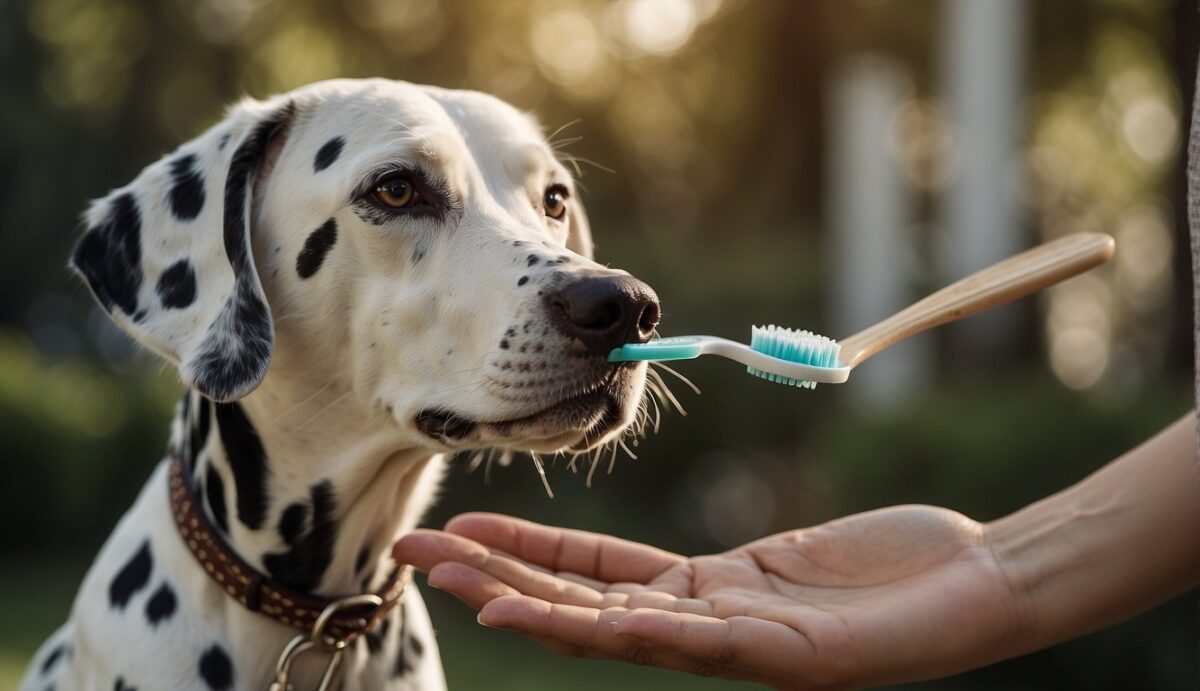
Effective dental care is pivotal for your Dalmatian’s well-being, as oral health significantly influences their overall health. Innovative technologies and research are carving the pathway for advanced preventative measures and treatments in canine dental care.
Emerging Technologies in Veterinary Dentistry
As you seek the best oral care for your Dalmatian, it’s exciting to see how new technologies are emerging to improve diagnosis and treatment.
Dental radiography is enhancing the ability to detect tooth decay and gum disease earlier, leading to more effective interventions.
Advanced dental imaging options, like 3D scans, are helping veterinarians plan and execute complex dental procedures with greater precision.
Research on dental-specific lasers for non-invasive treatments is showing promise in treating periodontal disease and speeding recovery times.
Research on Genetics and Oral Health
Understanding how genetics influence your dog’s oral health can lead to breakthroughs in preventing oral diseases.
Current research is focusing on identifying specific genes linked to gum disease and tooth decay in dogs.
With this knowledge, breeders and owners like you can be more informed about the potential risks and proactive in their Dalmatian’s dental care routine.
Developments in Preventative Dental Health Approaches
Prevention is always better than cure, especially when it comes to oral health.
Daily tooth brushing remains the gold standard for preventing periodontitis, but there are now more tools at your disposal.
Chew toys and dental diets are being designed with your Dalmatian’s dental health in mind, helping to reduce plaque and tartar buildup.
Additionally, dental sealants and veterinary formulated dental gels provide a supplemental protective barrier against decay.
Keep an eye out for upcoming preventative healthcare plans that may include regular professional dental cleanings and assessments to keep your furry friend’s teeth sparkling and strong.
Frequently Asked Questions (FAQs)
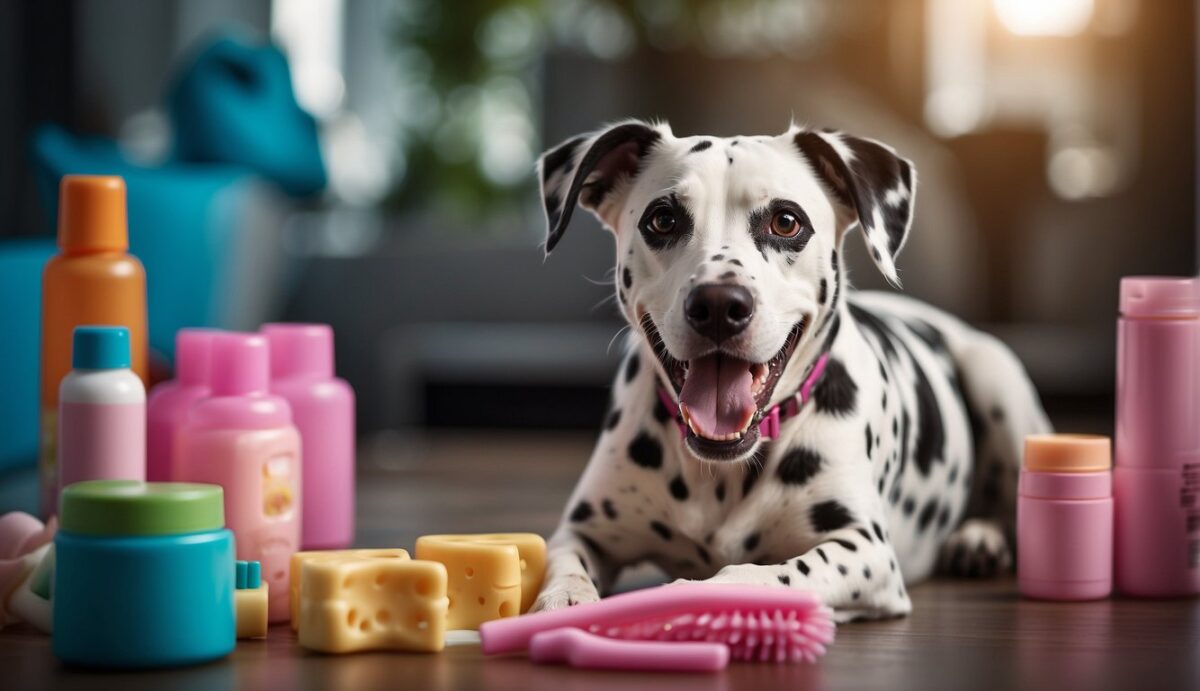
Maintaining your Dalmatian’s oral health requires consistent care and attention. Here, explore responses to common inquiries about gum disease and tooth decay in dogs.
What are effective home remedies for managing gum disease in dogs?
Brushing your dog’s teeth daily with canine-specific toothpaste can help manage gum disease.
Soft-bristled toothbrushes are ideal for this practice.
Additionally, dental chews and oral rinses designed for dogs can supplement your home care routine.
Can periodontal disease in dogs be treated with antibiotics, and if so, which are most commonly prescribed?
Antibiotics may be prescribed to treat periodontal disease in dogs, especially when infection is present.
Common antibiotics include Clindamycin, Doxycycline, and Amoxicillin.
However, they should only be used under veterinary guidance.
What steps can I take to prevent periodontal disease in my dog?
Ensure your dog receives regular dental check-ups and cleanings by a veterinarian.
Brush their teeth daily, provide dental chews, and consider diets formulated for dental health.
Good oral hygiene practices are crucial for prevention.
Are there natural ways to reverse periodontal disease in dogs?
While there’s no natural cure for advanced periodontal disease, maintaining a clean oral environment is key to slowing its progression.
This includes regular brushing with canine-friendly products and ensuring a balanced diet.
What are the signs and symptoms of gum disease in dogs?
Signs of gum disease in dogs include bad breath, red or swollen gums, bleeding, difficulty eating, and loose teeth.
If your dog displays any of these symptoms, consult with your veterinarian.
How can I prevent tooth decay in my canine friend?
Prevent tooth decay by brushing your dog’s teeth regularly with dog-specific toothpaste. Also, offering dental-appropriate toys and avoiding sugary treats can help.
Proper dental care is essential in preventing tooth decay.

